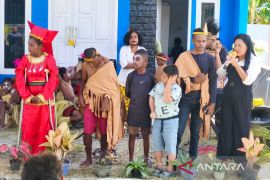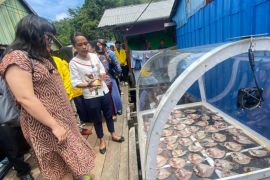Hiloi is a traditional wooden fork used to eat papeda, a staple food of the Papuan people made from sago.
More than just a utensil, hiloi is a symbol of cultural heritage, serving as a unifying tool for families and marking the identity of the Sentani tribe.
"Hiloi is not just a branch of wood. This tool embodies the philosophy of life of the Sentani indigenous people about togetherness, patience, and respect for ancestors," Orgenes Monim, a native cultural figure of the Sentani tribe, told ANTARA.
The Sentani tribe is an ethnic group that inhabits the Jayapura Regency area, Papua Province, especially around Lake Sentani and part of Jayapura City, with a population of around 30 thousand.
The tribe is spread across three geographical areas: the western group concentrated on Yonokom Island, the eastern group on Asei Island, and the middle group on Ifar Island.
In the culinary culture of the Sentani tribe, hiloi is always accompanied by a papeda container made from clay, or earthenware, called helai in Sentani language, and a clay dish for side dishes, known as hote.
Together, these three items form a traditional food serving system that is both aesthetically pleasing and rich in spiritual and ecological values.
Head of Culture at the Jayapura Regency Tourism and Culture Office, Fredrik Modouw, told ANTARA that hiloi is an important part of the cultural ecosystem that lives and develops in the community.
“The Sentani indigenous people have an emotional connection with hiloi. This eating utensil is present at family meals, traditional ceremonies, and even at church events. When someone dies, the family will serve papeda with hiloi as a symbol of a respectful farewell,” he remarked.
The process of making hiloi is not offhand. The wood used is usually sourced from certain trees such as matoa (Pometia pinnata), which is chosen for its strength and fineness of its fibers.
The process is carried out manually by craftsmen who inherit skills from previous generations.
Reflection
In June 2025, the people of Jayapura Regency will celebrate the existence of hiloi in a cultural event titled the Sejuta Hiloi Cultural Festival.
This festival will be held in Ebungfa Village, Ebungfauw District, as part of the efforts to preserve the intangible cultural heritage and strengthen the Sentani tribe's local identity.
The festival, initiated along with the Ebungfa Village community, is expected to be a forum for exploring, celebrating, and re-introducing the meaning of hiloi to the community, especially the younger generation.
In this festival, the community is not only invited to watch cultural performances but also to participate in hiloi-making workshops, traditional attractions, and local culinary exhibitions.
The coordination meeting held in late April 2025 brought together traditional figures, traditional leaders (Ondoafi), women's figures, youth, and representatives from cultural communities.
The meeting discussed technical aspects in the implementation of the festival, the formation of the committee, and the division of roles for each party.
"Our main goal is to build awareness that hiloi is not a museum object. It is still alive, used, and must be actively inherited. Therefore, this festival is designed as a forum for learning and cross-generational encounters," Fredrik Modouw emphasized.
Meanwhile, this festival will feature a series of activities, including cultural attractions and traditional ceremonies, such as the procession of eating papeda together using hiloi and traditional art performances, such as the yosim pancar dance and folk songs.
Traditional competitions such as the fast papeda eating competition, hiloi making, and storytelling of Sentani legends, as well as interactive workshops on the technique of hiloi carving and forming strands and hote will also be held.
The festival will also feature an exhibition of micro, small, and medium enterprises (MSMEs) and local culinary products, showcasing handicraft products, sago and fish-based foods, and non-timber forest products, as well as a folk stage, where young Sentani people express their creativity through poetry, acoustic music, and drama.
Cultural regeneration
Amid globalization, which brings with it a strong influence of foreign cultures, hiloi has become one of the cultural symbols at risk of being abandoned.
Many young Papuans, especially those in urban areas, are unfamiliar with the function and meaning of hiloi.
“Children today must know that before there were spoons and forks from factories, our parents lived in harmony with homemade cutlery. They did not just eat but felt the presence of their ancestors through hiloi,” Orgenes Monim stated.
The Sejuta Hiloi Festival is expected to be an important momentum to revive this tradition. Through a participatory approach, this festival seeks to ensure that young people are involved not only as spectators but also as actors and heirs of culture.
To that end, the festival committee will involve students from various schools in the Ebungfauw District and its surroundings, allowing them to learn from the craftsmen, perform on the cultural stage, and participate in the competitions.
This festival is more than just an effort to preserve culture but also directed as part of a strategy for developing culture-based tourism in Jayapura Regency. The potential for cultural tourism around the Lake Sentani area is huge but has yet to be optimally developed.
"By introducing hiloi as a symbol of Sentani culture, we are also creating a unique local brand. Tourists come not only to see the lake but also to experience the tradition of eating papeda directly from the kitchen of the indigenous community," Modouw remarked.
The Sejuta Hiloi Cultural Festival is expected to become an annual agenda that can be included in the Papuan cultural event calendar.
In addition to strengthening the community's identity, this festival will open up new economic opportunities for craftsmen, sago farmers, traditional fishermen, and local MSMEs.
Ebungfa Village was chosen as the host because it is considered to have preserved its traditions. The residents live by the lake, still use traditional equipment in their daily lives, and are strongly committed to preserving culture.
"Ebungfa is an example of a village that is not disconnected from its traditional roots. We want to raise them as a model for organic cultural regeneration," Modouw noted.
For the Ebungfa community, this festival is not just a celebration but also a responsibility to demonstrate to the world that Papuan culture is not lost, extinct, or obsolete.
Instead, it lives in the quiet of the kitchen, in the sharing of papeda, and in the hands that lovingly craft hiloi.
Hiloi carries a profound message that culture is a shared heritage that must be maintained, valued, and passed on.
Through the Sejuta Hiloi Festival, the people of Jayapura Regency are rewriting their cultural narrative, not as a forgotten past but as a legacy carried into the future.
Related news: Jayapura Sentani tribe bid rousing farewell to Lukas Enembe
Related news: Noken Festival to celebrate Indonesian culture: minister
Translator: Yashinta Difa Pramudyani
Editor: Azis Kurmala
Copyright © ANTARA 2025












